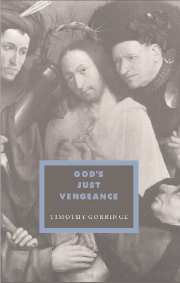Book contents
- Frontmatter
- Contents
- General editors' preface
- Acknowledgements
- List of abbreviations
- 1 Religion and retribution
- PART I THE CULTURAL FORMATION OF ATONEMENT: BIBLICAL SOURCES
- PART II MAKING SATISFACTION: ATONEMENT AND PENALTY 1090–1890
- 4 The ladder of all high designs
- 5 The wounds of Christ
- 6 Three angry letters in a book
- 7 The moral government of the universe
- 8 The age of atonement
- PART III CONTEMPORARY DIRECTIONS IN ATONEMENT AND PENAL THEORY
- Select bibliography
- Index
- CAMBRIDGE STUDIES IN IDEOLOGY AND RELIGION
5 - The wounds of Christ
Published online by Cambridge University Press: 25 January 2010
- Frontmatter
- Contents
- General editors' preface
- Acknowledgements
- List of abbreviations
- 1 Religion and retribution
- PART I THE CULTURAL FORMATION OF ATONEMENT: BIBLICAL SOURCES
- PART II MAKING SATISFACTION: ATONEMENT AND PENALTY 1090–1890
- 4 The ladder of all high designs
- 5 The wounds of Christ
- 6 Three angry letters in a book
- 7 The moral government of the universe
- 8 The age of atonement
- PART III CONTEMPORARY DIRECTIONS IN ATONEMENT AND PENAL THEORY
- Select bibliography
- Index
- CAMBRIDGE STUDIES IN IDEOLOGY AND RELIGION
Summary
Red my feet with flowing blood,
Holes in them washed through with that flood.
Mercy on Man's sins, Father on high!
Through all my wounds to thee I cry!
Anon, (thirteenth century)The notion of a ‘middle age’ (media aetas, medium aevum) between ancient and modern, characterising the four hundred years between Abelard and Luther, emerged in the fifteenth century, but only became thoroughly familiar after the eighteenth century, with the re-evaluation of medieval art, and the rise of ‘Gothic’. Twentieth-century historical scholarship has increasingly challenged the periodisation assumed by Michelet and Burckhardt, tracing the roots of humanism, reform and renaissance as far back as the twelfth and thirteenth centuries. Economic development accelerated from the late eleventh century on. From being uncertain and reversible economic growth became ‘rapid, ubiquitous, and for a time apparently limidess’. Land tenure gradually became less important, and money payment more significant. As these centuries wore on the merchant class became ever more important until, by the fifteenth century, the richest merchants bought their way into the elite ranks of the hereditary peerage. Throughout the period social hierarchy remained of great importance, but it was transformed from within. The basic social distinction shifted from that between noble and non-noble to that between those who were and those who were not entitled to bear arms. At the lower end of the social scale resentment of servile status was reflected in peasant movements, in popular preaching, and in stubborn resistance to some forms of taxation. The church's hegemony in intellectual and administrative life proved short lived, and by the thirteenth century lay officials, often lawyers, were taking leading roles in administration.
- Type
- Chapter
- Information
- God's Just VengeanceCrime, Violence and the Rhetoric of Salvation, pp. 104 - 125Publisher: Cambridge University PressPrint publication year: 1996



